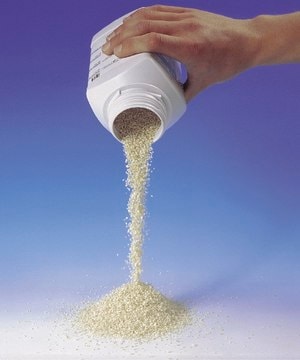1.03915
GranuCult® Triple sugar iron agar
pkg of 500 g, for Enterobacter spp., for Salmonella spp., for Shigella spp., degradation of sugar and accompanying acid production is detected by the pH indicator phenol red
Synonym(s):
TSI agar
About This Item
Recommended Products
Agency
AOAC®
EP
FDA-BAM
USP
Quality Level
sterility
non-sterile
form
granular
packaging
pkg of 500 g
manufacturer/tradename
GranuCult® prime
technique(s)
microbe id | utilization test: suitable
microbiological culture: suitable
pH
7.4 (37 °C, 65 g/L in H2O, after autoclaving)
solubility
65 g/L
bulk density
650 kg/m3
application(s)
food and beverages
microbiology
storage temp.
15-25°C
suitability
Citrobacter spp.
Enterobacter spp.
Escherichia coli
Klebsiella spp.
Proteus spp.
Salmonella spp.
Shigella spp.
coliforms
enterobacteriaceae
General description
Application
Features and Benefits
- Safe and sustainable due to reduced risks associated with fine dust and toxic substance inhalation, resulting in a safer work environment
- Excellent wettability, solubility, and free flowing properties
- Convenient, with minimal component separation and clumping, even under warm or humid conditions
- High batch-to- batch reproducibility
- Prolonged shelf life of up to five years
- High number of test strains exceeding all regulatory demands
- Granulation technology allowing many supplements to be included, with no need to add these separately
Analysis Note
Appearance (colour): red
pH-value (25 °C): 7.2 - 7.6
Growth (Escherichia coli ATCC 25922 (WDCM 00013)): good to very good
Growth (Citrobacter freundii ATCC 8090): good to very good
Growth (Enterobacter cloacae ATCC 13047 (WDCM 00083)): good to very good
Growth (Shigella flexneri ATCC 12022 (WDCM 00126)): good to very good
Growth (Salmonella typhimurium ATCC 14028 (WDCM 00031)): good to very good
Growth (Salmonella enteritidis ATCC 13076 (WDCM 00030)): good to very good
Growth (Proteus mirabilis ATCC 14153): good to very good
Growth (Proteus hauseri ATCC 13315): good to very good
Butt (Escherichia coli ATCC 25922 (WDCM 00013)): yellow
Butt (Citrobacter freundii ATCC 8090): yellow/black
Butt (Enterobacter cloacae ATCC 13047 (WDCM 00083)): yellow
Butt (Shigella flexneri ATCC 12022 (WDCM 00126)): yellow
Butt (Salmonella typhimurium ATCC 14028 (WDCM 00031)): yellow/black
Butt (Salmonella enteritidis ATCC 13076 (WDCM 00030)): yellow/black
Butt (Proteus mirabilis ATCC 14153): yellow/black
Butt (Proteus hauseri ATCC 13315): yellow/black
Slant surface (Escherichia coli ATCC 25922 (WDCM 00013)): yellow
Slant surface (Citrobacter freundii ATCC 8090): yellow
Slant surface (Enterobacter cloacae ATCC 13047 (WDCM 00083)): yellow
Slant surface (Shigella flexneri ATCC 12022 (WDCM 00126)): red
Slant surface (Salmonella typhimurium ATCC 14028 (WDCM 00031)): red
Slant surface (Salmonella enteritidis ATCC 13076 (WDCM 00030)): red
Slant surface (Proteus mirabilis ATCC 14153): red/black
Slant surface (Proteus hauseri ATCC 13315): yellow
Incubation: 24 hrs.; 35 °C; aerobic.
Footnote
The designations basic, plus, or prime are added to indicate the quality control level, from basic quality control to standard QC plus to prime for full regulatory compliance.
Legal Information
Storage Class Code
11 - Combustible Solids
WGK
WGK 3
Certificates of Analysis (COA)
Search for Certificates of Analysis (COA) by entering the products Lot/Batch Number. Lot and Batch Numbers can be found on a product’s label following the words ‘Lot’ or ‘Batch’.
Already Own This Product?
Find documentation for the products that you have recently purchased in the Document Library.
Articles
Technical article on Cultivation of Shigella
Shigella spp. are predominantly connected to humans and are rarely isolated from other animals, with the exception of primates.
Protocols
Specifies a horizontal method for the detection of Salmonella spp. in the food production chain.
Our team of scientists has experience in all areas of research including Life Science, Material Science, Chemical Synthesis, Chromatography, Analytical and many others.
Contact Technical Service

